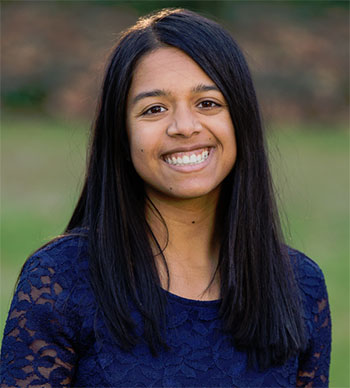Student Voice
Rain
By Vishnupriya Krishnan
 (May 2018) I remember the day her family brought her in, from their village several miles away, because rain was falling so thickly outside that it looked like a curtain. The medics laid her down on one of the beds in the trauma room, and immediately the doctors began rolling up her sleeves to poke for veins. Her wrinkled skin was dotted by so many different colors of lesions that it looked as though Monet’s water lilies were blooming on her swollen belly, but her face was young and bright, like the moon. She must not have been more than thirteen.
(May 2018) I remember the day her family brought her in, from their village several miles away, because rain was falling so thickly outside that it looked like a curtain. The medics laid her down on one of the beds in the trauma room, and immediately the doctors began rolling up her sleeves to poke for veins. Her wrinkled skin was dotted by so many different colors of lesions that it looked as though Monet’s water lilies were blooming on her swollen belly, but her face was young and bright, like the moon. She must not have been more than thirteen.
“This is something you’ll never see in the States,” the doctor said to me, “An advanced case of tuberculosis.” I wrapped the blood pressure cuff around her emaciated arm, slid the pulse oximeter onto her limp index finger, while medical students and residents swarmed around her, whispering words like “critical” and “fascinating,” and then her eyes, previously fluttering with delirium, flickered open and looked straight at me.
Her pain hit me like a thunderclap. She squeezed my hand white as a medical student struggled to insert a catheter for the first time. I thought of the sacrifices patients’ bodies endure for us to learn so much, and I squeezed back.
I smoothed her hair away from her sweaty forehead. I don’t remember exactly what I said to her – phrases like “cavitary lesions” and “hematogenous spread” were buzzing around in my head – but I told her she was brave, that everything would be okay. The doctors put more lines in and she looked at me and squeezed my hand some more.
Later that day, I came back to sit with her. Faint anguished whispers escaped her mouth. From the smell in the room, I could tell that she had soiled her sheets. The medical students and doctors were at the next trauma bed, for an elderly man with pesticide poisoning had been brought in, and no X-rays could be taken for our patient anyway until it stopped raining, for the imaging building was across the street.
I lifted each of her legs slowly – each movement was excruciating – and slid the dirty sheet out from underneath her, averting my eyes to siphon away some of the shame, replacing the bedding with a fresh sheet. When I had finished, her face was wet with tears. That evening, she was wheeled to the ICU – the last time I would see her.
I had complained about the language barrier over dinner a couple nights ago with my friends, how it was difficult to learn about patients beyond the few sentences and lab values we read in their charts. But this pain in my patient’s cracked lips and brimming eyes I understood. I understood.
I understood, too, the pain that comes with witnessing pure suffering without knowing how to predict the outcome. Patients come into our lives and leave footprints on our hearts, and we are never the same for it. Maybe part of being a healer is simply committing to being a witness. Listening to your patient. Holding
their hand. Journeying with them across the uncharted waters of their illness. Affirming their human dignity.
Vishnupriya Krishnan, a second-year medical student, wrote this essay for the “Literature, Art and Medicine” elective. She is on the editorial board of The Human Touch, an anthology of poetry, prose, photography and graphic art from the Anschutz Medical Campus community.